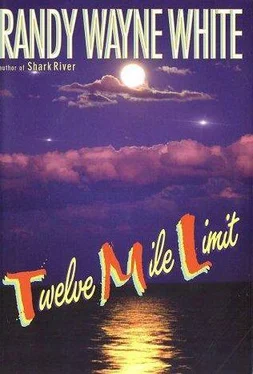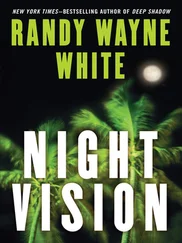Randy White - Twelve Mile Limit
Здесь есть возможность читать онлайн «Randy White - Twelve Mile Limit» весь текст электронной книги совершенно бесплатно (целиком полную версию без сокращений). В некоторых случаях можно слушать аудио, скачать через торрент в формате fb2 и присутствует краткое содержание. Жанр: Триллер, на английском языке. Описание произведения, (предисловие) а так же отзывы посетителей доступны на портале библиотеки ЛибКат.
- Название:Twelve Mile Limit
- Автор:
- Жанр:
- Год:неизвестен
- ISBN:нет данных
- Рейтинг книги:4 / 5. Голосов: 1
-
Избранное:Добавить в избранное
- Отзывы:
-
Ваша оценка:
- 80
- 1
- 2
- 3
- 4
- 5
Twelve Mile Limit: краткое содержание, описание и аннотация
Предлагаем к чтению аннотацию, описание, краткое содержание или предисловие (зависит от того, что написал сам автор книги «Twelve Mile Limit»). Если вы не нашли необходимую информацию о книге — напишите в комментариях, мы постараемся отыскать её.
Twelve Mile Limit — читать онлайн бесплатно полную книгу (весь текст) целиком
Ниже представлен текст книги, разбитый по страницам. Система сохранения места последней прочитанной страницы, позволяет с удобством читать онлайн бесплатно книгу «Twelve Mile Limit», без необходимости каждый раз заново искать на чём Вы остановились. Поставьте закладку, и сможете в любой момент перейти на страницу, на которой закончили чтение.
Интервал:
Закладка:
I lifted my head slightly. “No. I don’t hear anything.”
“That’s what I mean. He’s stopped. Finally, the poor darling’s stopped. Probably exhausted.”
She meant Jeth.
Then, after another long silence, she said, “Doc, there’s one thing I will never understand. If Janet and the other two were wearing those big, inflated vests, why didn’t we find them? All those air hours, the choppers and planes, and all the boats out here looking. Why? It seems almost impossible.”
I said, “I don’t know, JoAnn. It does seem impossible. That’s one question I can’t answer.”
Rhonda joined us for a bit. She came topside, sniffling and snuffing, a tall, skinny-hipped woman with short brown hair and a heart as big as Tomlinson’s. Her voice was quivering as she said, “You got room there for one more?” and slid her long body in behind me when I lifted the blanket as invitation.
I’ve read somewhere that certain religious groups and some primitive societies practice a form of healing known, variously, as “powwowing” or “hiving” in which members of the group unite in what is, essentially, an extended communal hug. I don’t believe in herbal cures or faith healing, but I have to admit that, lying between those two women, sandwiched by people whom I’ve come to respect and love, I felt better than I had since the end of our second day searching for Janet. Why? Because by the end of that long day, I was pretty certain that Janet was gone.
The sense of respite didn’t last, though. The two ladies returned to their own beds a little after midnight, and I still couldn’t sleep. Couldn’t get the question What had it been like? out of my mind. It was a haunting question to consider.
I am not an overly emotional person. Indeed, I believe that once a decision has been made, or an event has occurred, any investment in or concession to emotion is a waste of time and energy.
Even so, Janet remained a lucent image, her private eyes staring into mine. There was a shyness in them, and a brand of kindness that comes only from deep pain. Finally, I realized that there was only one way to come close to understanding what she had experienced the night that she and the others were set adrift.
I have an orderly mind that sometimes insists on factual, experiential input. So I threw off the blanket and walked to the boat’s transom. I was wearing running shorts, no shirt, and the deck was damp beneath my bare feet. Except for the wind and the creaking of wood and braided line, it was quiet now. Below, JoAnn and Rhonda were either asleep or trying to sleep.
High in the sky was a quarter moon. It was all the light I needed. I rummaged through a stern storage hatch, tied a mooring line to a life ring, and tossed the line astern. Then I slipped over the transom into the sea.
You might expect water that’s seventy-seven degrees to be warm, but it isn’t, and the sudden chill caused my lungs to spasm momentarily.
I allowed my body to submerge, which seemed to warm it, then I held on to the line as breakers freighted me outward. Now, six days after the sinking of the Seminole Wind, conditions were still almost exactly as they had been the night that Janet and the other three were set adrift. The wind was fifteen to twenty knots out of the east-southeast, seas building.
I felt my body contort rag doll-like as the first big wave flooded over me, then lifted me: big waves without rhythm on a windy night. I could feel them rolling past, lifting, suctioning, then tumbling me under. Even with the quarter moon, I couldn’t see the waves, but I could hear them coming-a keening sound, the sound of wind over ice-and their approach was felt as an expanding buoyancy.
Janet’s first night out here was one day into a waxing moon. I’d checked the tide tables. On the previous Friday, the day her boat sunk, sunset was at 5:38 P.M.; the setting of the frail lunar crescent was exactly fifty-eight minutes later. Hers would have been a blacker night with stronger currents.
Still drifting outward-bound on the line, I turned away from the Satin Doll. Miles to the east was a flashing light. It was the 160-foot-high navigation tower to which the lone survivor, Amelia Gardner, had swum after being separated from her companions, and where she’d been found by the Coast Guard chopper thirty-eight hours later. From the crests of waves, the light was an explosion of white; from the troughs, it was a milky concussion. Every four seconds, the light flared: a visual hypnotic that penetrated to the brain, oscillated the pupils, eroded equilibrium.
If I stared at the light too long, I lost all depth perception. The tower might have been three miles away or it might have been a satellite flashing from outer space. When I forced myself to continue staring at the light, I began to feel a sickening sense of unreality. Where did the sky end and the sea begin? Was I looking up at the stars, or looking down from them in the midst of some disturbing dream?
I have made many long swims in open water at night, yet it was unpleasant, even for me-the wallowing darkness of being in a wave’s trough, then suddenly vaulted starward only to be temporarily blinded by that distant strobe. I found the prospects of trying to make such a swim scary as hell. Janet was a novice diver and an average swimmer. For her, it had to have been an existential nightmare-not the first living nightmare of her tough, tough life.
An Olympic ski racer once told me that the most frightening aspect of the sport was pointing her skis downhill. As a waterman, I had had to scan awhile to find the empathic equivalent. I decided that pointing a small boat offshore, out of sight of land, was similar. Both acts were expeditionary; both were a kind of voluntary untethering. I described for her how the wheel torques at the hands, trying to veer shoreward. She said, “Yes, yes-it’s the same with skis.” We might have been discussing mountains: Hers was white, mine gray.
Dread of the abyss is communal among outdoor people. It is not the fear that unites us, but the potential that anything, absolutely anything, can happen. It creates a kind of congenial freemasonry-perhaps because feelings of dread, like nightmares, usually vanish when exposed to light.
For Janet, though-if she survived it-enduring such a night would not have been mitigated by the first pale streaks of a windy dawn. The Gulf of Mexico had been slowly killing her, killing her without conscience, and she would certainly have been aware that there was no escape.
I now knew some of the sensory components she had experienced. But rolling there on a black sea, beneath a black sky, I found myself troubled on a deeper level. The phenomenon that is human existence can be described in a number of ways, and one of those ways is chemical. There are ninety-two elements found in nature, and sixty-six of those are found in seawater. Blood and human protoplasm, the salty components that are the source of life, contain many of those elements in the same precise proportions as our major oceans.
As I drifted, I felt reduced. I felt clinically defined, though not insignificant because the word significant implies a judgment of worth, and I had no worth. Nor did the life and death of Janet Mueller. Nor the horror she had endured. I was hydrogen, sodium, chlorine, sulfur, potassium, and carbon. I was a soup of electrolytes that fired a brain that, inexplicably and absurdly, had evolved beyond the requirements of base survival and reproduction. I was skin over a scaffolding of lime-hardened skeleton that I’d inherited from the calcium-dense oceans of Cambrian time.
Perhaps Tomlinson was right. Perhaps humans are no better, of no more value, than dogs or a fish or manatees. For reasons I cannot comprehend, he seems to find that philosophy freeing. I meet more and more people who feel similarly. They apparently find some level of peaceful, spiritual equity by viewing all life as homogeneous and equal.
Читать дальшеИнтервал:
Закладка:
Похожие книги на «Twelve Mile Limit»
Представляем Вашему вниманию похожие книги на «Twelve Mile Limit» списком для выбора. Мы отобрали схожую по названию и смыслу литературу в надежде предоставить читателям больше вариантов отыскать новые, интересные, ещё непрочитанные произведения.
Обсуждение, отзывы о книге «Twelve Mile Limit» и просто собственные мнения читателей. Оставьте ваши комментарии, напишите, что Вы думаете о произведении, его смысле или главных героях. Укажите что конкретно понравилось, а что нет, и почему Вы так считаете.












